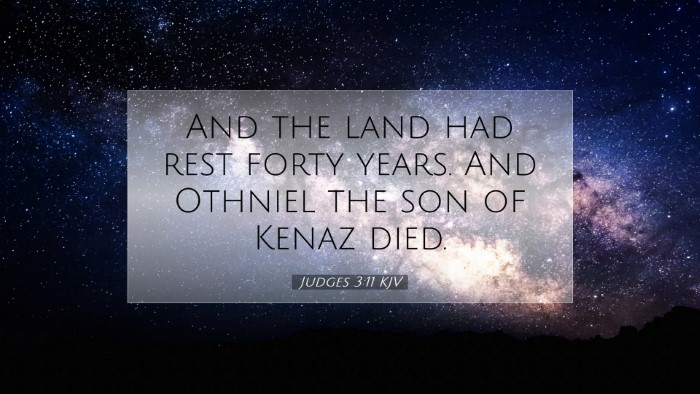Commentary on Judges 3:11
Judges 3:11 states: "And the land had rest forty years. And Othniel the son of Kenaz died."
This verse encapsulates a significant transition within the narrative of the Book of Judges, highlighting the cycles of oppression and deliverance that Israel undergoes.
Historical Context
The Book of Judges is situated in a tumultuous period of Israel's history, characterized by a lack of centralized leadership after the death of Joshua. The narrative reflects a cycle of sin, suffering, supplication, and salvation. Understanding the context helps elucidate the significance of Othniel’s judgeship and the peace he brought to Israel.
Othniel: A Study of His Character
Othniel, the first judge of Israel, is introduced in Judges 3:9 as the deliverer raised by God. He embodies qualities of leadership that are vital for Israel’s restoration. Significant points regarding Othniel include:
- Lineage: Othniel is noted as the son of Kenaz. This lineage illustrates a connection to Caleb, the faithful spy, establishing a heritage of courage and faithfulness.
- Instrument of Deliverance: His military prowess is evident in the conquest of cities, showcasing reliance on God for victory.
Thematic Insights
The phrase "the land had rest" denotes a period of peace and stability that directly correlates with good leadership and God’s favor. The relationship between the people and their leaders is pivotal:
- Sovereignty of God: The rest provided during Othniel’s judgeship illustrates God's sovereignty and providence over Israel.
- Consequences of Leadership: The subsequent vacuum of leadership following Othniel's death accentuates the temporal nature of earthly leaders.
- Sin and Its Aftermath: The pattern of rest followed by disobedience reiterates the cyclical nature of human behavior away from divine instruction.
Reflections on "The Land Had Rest"
The phrase speaks volumes about the spiritual and physical state of Israel:
- Temporal Peace: This period denotes not only military peace but an opportunity for spiritual renewal among the Israelites.
- Significance of 'Rest': This rest can be viewed as a metaphor for spiritual rest found in obedience to God, akin to the rest referred to in Hebrews 4.
Application for Today's Believers
Modern readers can draw several pertinent lessons from this passage:
- The Importance of Godly Leadership: The example of Othniel underscores the necessity for leaders to be godly and committed to divine principles to foster peace and stability.
- Vigilance Against Complacency: Just as Israel’s tranquility was vulnerable post-Othniel, believers are called to remain vigilant in spiritual practices to avoid the cyclical nature of rebellion and restoration.
- Embracing Rest through Faith: True rest, as manifested in this passage, is reflective of a relationship with God, encouraging believers to seek peace through faith and obedience.
Conclusion
Judges 3:11, while concise, encapsulates profound themes of leadership, divine sovereignty, and the human tendency toward cyclical disobedience. It serves as a reminder of the consequences of leadership on the collective well-being and the enduring need for faithful leaders in all generations.


